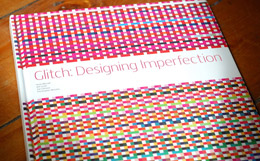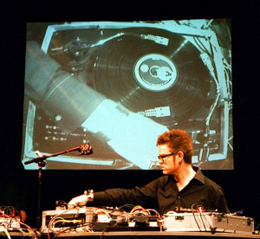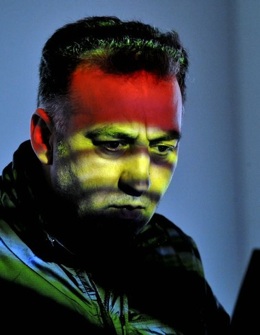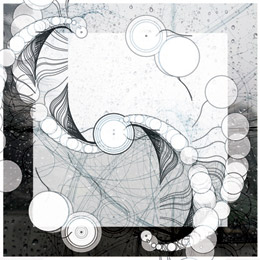
Skizzenhafter Musik haftet leider immer ein wenig der Hauch des Halbgaren an, erst Recht auf Albumlänge. Dass dem nicht so sein muss und Musik in kleinen Happen durchaus auch von Vorteil sein kann, beweisen die liebenswerten Banalitäten von Gintas K. 14 kurze elektronisch Stücke, manchmal nicht viel mehr als das schnelle Ausloten eines Sounds, oftmals aber auch umfassend eingefangene Stimmungsbilder. Stücke wie “Q” zeigen, wie mit einfachsten Mitteln wunderbare Moodmusik erschaffen werden kann, die trefflich die Stimmung und Atmosphäre langer Nächte verbreitet. Wohlgemerkt – allein mit Mitteln der Kleinstteilelectronica – mit Knistern, Bleepen, Rauschen und Knacken. Tipp!
UBERMORGEN.COM at ISEA 09

UBERMORGEN.COM will present their keynote “Superenhanced” at this year’s ISEA in Belfast, tomorrow at 5PM. Their installation “Superenhanced Guantanamo Military Tribunal” is on display at the Golden Thread Gallery in Belfast.
Glitch: Designing Imperfection

Glitch – Designing Imperfection was curated and edited by Iman Moradi and Ant Scott, and it features work from several of Crónica’s artists and friends, and interviews with Angela Lorenz, Ant Scott, Kim Cascone, O.K. Parking, Johnny Rogers and a Foreword by Per Platou. This 132 page book will be available in September, but you can pre-order it through amazon: http://www.amazon.com/dp/0979966663 http://www.amazon.co.uk/dp/0979966663/ http://www.amazon.de/dp/0979966663/ http://www.amazon.co.jp/dp/0979966663
“Compilation Works 1996-2005†reviewed by Bad Alchemy

Einen 10-jährigen Querschnitt durch das Schaffen des Darmstädter Klang & Mehr-Künstlers MARC BEHRENS bietet Compilation Works 1996-2005 (Crónica 041, Digital release). Behrens ist Citoyen des Königreichs Elgaland-Vargaland (KREV), mit guten Connections nach Lissabon, wo er 2003-07 das Label Sirr mitleitete. Die Zusammenstellung umfasst seine Reinterpretationen von Disinformationen, John Hudak, Ilios, TV Pow und Ralf Wehowsky, seine Reaktionen auf Fotos, gefunden an Straßenlampenpfosten in Afghanistan, und auf den Ausbruch des Irakkrieges, wie er ihm aus Taxis und Bars in Lissabon zu Ohren kam. Bei diesen Publikationen auf Alluvial Recordings, Antifrost, Ash International, Atavistic/EMK, ATAK, Banned Productions, Meme, Mille Plateaux, Raster-Noton, Selektion, Sirr findet man direkte Widmungen an Coca Cola, Dimitris Kariofillis (Ilios & Antifrost) und die griechische Performancekünstlerin Lida Patta und indirekte an Chris Marker und Stockhausens Gesang der Jünglinge. Der zerebrale und mehr noch der physische Mehrwert von Behrens unspektatkulärer Soundart erschließt sich meist erst mit Gebrauchsanweisung. Vieles riecht nach Dokumenta X, Interpretation ist gefragt. Ohne den Kontext einer Installation oder Performance bleibt Vieles grau in grau.
Janek Schaefer interviewed by Ear Room

Janek Schaefer is a UK based sound artist, musician, and composer born in England to Polish and Canadian parents in 1970. His concerts and installations explore spatial and architectural aspects of sound, and employ hybrid analogue and digital techniques, modified vinyl, and found sounds. Janek’s work has been exhibited and released by numerous galleries and labels across the globe and in 2008 he won The British Composer of the Year Award for Sonic Art & The Paul Hamlyn Award for Composers Prize.
Full interview at Ear Room.
Janek has released “Hidden Name†(with Stephan Mathieu) in Crónica and has a new work in preparation.
“Lovely Banalities†reviewed by Bad Alchemy

Via Berlin und Lissabon erreichten mich Klänge aus Litauen. GINTAS K hat daheim in Marijampolé aus Klängen, die er an einem windigen Sonntagnachmittag beim Spazierengehen einfing, und Alltagsgeräuschen im Haus – ein Besetztzeichen des Telefons z.B. – 14 Lovely Banalities (Crónica 040) für ein Audiopoesiealbum gesammelt. Seine beiläufigen Funde, der Wind, Vögel, der Klang seiner Schritte, ein plätschernder Bach etc., sind eingebettet, eingearbeitet in laptop-typisch rauschendes Gedröhn, gelegentlich rhythmisiert, meinst nur flatternd zermulcht, kraus gewellt, aufgeregt tüpfelig, gesprüht, kullerig. Melodisches Summen mischt sich mit einer brachialen Kaskade, Glitches brodeln, es furzelt, blitzelt, funkelt, stottert. Die immer wieder hörbaren Schritte erinnern, wohl gewollt, an Musorgskys Bilder einer Ausstellung und an sich Unbemerkenswerten. Die Ästhetisierung des Alltags durcht den Alltag ? Warum fällt mir jetzt der Politiker ein, der vorkaute, dass man mit 5€ am Tag fürstlich leben kann?
“1001 Songs of eBay†reviewed by Bad Alchemy

Athanasius Kirchner, Raymond Queneau, UBERMORGEN.COM && NUSSBAUMER, sie alle erfanden Wunderautomaten, Wort- oder Tonmaschinen, für Hunderttausend Milliarden Gedichte oder 1001 Songs of eBay (Crónica 043, Digital release). Lizvlx & Hans Bernhard, ein Wien – & St.Moritz-basiertes Gespann von Net-Artisten, Pixel-Boxern und Media-Hackern, lassen zusammen mit Stefan Nussbaumer, “Kultur-Techniker” aus der osttiroler Sonnenstadt Lienz – Wahlspruch: Die Technik ist (m)ein Hund – eine SC3 Supercollider sound-generation engine für jeden Benutzernamen, den man bei www.sound-of-ebay.com eingibt, einen spezifischen “Song” generieren. Wozu ? Um sich nie mehr zu langweilen mit über 51 Sunden, 4 GB, potenziell aber unerschöpflichem, superbilligem Elektrogeplimpel? Mit Unterhaltung, fast wie geschenkt? Die Kehrseite – dieses Esel-streck-dich an heiter schnurrender, eifrig klopfender, unermüdlicher und nie um “Einfälle”, sprich Variationsmöglichkeit verlegener Funkyness ist ein Zeitfresser. Gegenrechnung: Zeit = Geld, Lebenszeit = Blut -> Plimpelscheißer = Zeitfresser = Dieb = Vampir. Basta. > 51 STunden, um den eBay-Konsumismus zu veräppeln? Wer sich heute mit Pixeln und Gigabytes zuscheißen lässt, wird übermorgen nicht nach Rosen duften.
Vitor Joaquim interviewed by Paralelo 33

Vitor Joaquim is interviewed by the Portuguese web publication Paralelo 33.
Template 2.0 at ISEA 2009

Template 2.0, an interdisciplinary multiformat exhibition curated by Joe Gilmore and Chris Murphy presents works of digital artists and is part of the ISEA2009 conference to be held in Belfast in August. Lia, Carvalhais and Tudela’s collaboration entitled “Because Someone Said ‘So’â€, produced for the first Template exhibition will be shown once again, along with pieces by Dextro, alorenz, Mark Fell, Tina Frank, Semiconductor, and others. Opens next thursday.
“Erotikon†is album of the month for The Garden of Earthly Delights

The Beautiful Schizophonic’s latest release in Crónica, “Erotikon†was selected as album of the month by Milton Keynes’ Cable Radio show The Garden of Earthly Delights.
